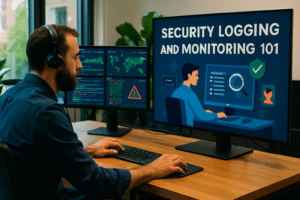
Intro to ethical hacking
In the rapidly evolving landscape of technology, the concept of ethical hacking has emerged as a cornerstone of digital security and trust. As organizations and individuals increasingly rely on interconnected systems, the importance of understanding how to safeguard these environments cannot be overstated. Ethical hacking not only protects data and infrastructure but also empowers a new generation of tech professionals to think critically and creatively about security challenges.
What Is Ethical Hacking?
Ethical hacking, often referred to as penetration testing or white-hat hacking, involves simulating cyberattacks on computer systems, networks, or applications with the purpose of identifying and fixing security vulnerabilities before they can be exploited by malicious actors. Unlike cybercriminals, ethical hackers operate within the boundaries of the law and with explicit permission from system owners.
“Ethical hacking is not about breaking the law or causing harm. It’s about understanding how systems work—and how they can fail—so that we can make them stronger and more resilient.”
These professionals use the same tools and techniques as black-hat hackers but with a fundamentally different intention: to protect, not to exploit. Their work forms the backbone of modern cybersecurity and is essential for building trust in digital environments.
The Legal and Ethical Foundations
One of the most common misconceptions is that hacking, by definition, is illegal. In reality, ethical hacking is legal because it is conducted with consent and for legitimate purposes. Organizations may hire independent security consultants or maintain in-house teams to carry out penetration tests, vulnerability assessments, and security audits.
Legal frameworks such as the Computer Fraud and Abuse Act (CFAA) in the United States, or similar laws in other countries, distinguish between unauthorized and authorized access. Ethical hackers always operate under clear agreements, known as “scope of work” documents, which define what systems can be tested, how the tests will be conducted, and what actions are strictly off-limits.
Professional certifications, such as the Certified Ethical Hacker (CEH) or Offensive Security Certified Professional (OSCP), provide ethical hackers with a structured code of conduct and a clear understanding of their responsibilities.
Why Ethical Hacking Matters
In today’s connected world, digital threats are constantly evolving, from sophisticated malware to targeted phishing campaigns and complex social engineering attacks. The stakes are high: a single security breach can result in financial loss, reputational damage, and legal consequences.
Ethical hackers are the front-line defenders in this ongoing battle. They help organizations:
- Identify and patch vulnerabilities before attackers can exploit them
- Meet regulatory and compliance requirements
- Educate staff on security best practices
- Develop incident response plans and resilience strategies
For individuals, ethical hacking offers an intellectually stimulating and rewarding career path. It combines elements of problem-solving, creativity, and continuous learning, making it an ideal field for those who are curious, analytical, and passionate about technology.
Women and Neurodivergent People in Ethical Hacking
The cybersecurity field, and ethical hacking in particular, has historically been male-dominated. However, there is a growing recognition of the importance of diversity in defending against complex threats. Women and neurodivergent individuals bring unique perspectives and skills that are invaluable in this field.
Women often excel in collaborative problem-solving and communication—critical aspects of effective security work. Similarly, neurodivergent professionals, including those with autism, ADHD, or dyslexia, frequently demonstrate exceptional pattern recognition, persistence, and unconventional thinking. These strengths can lead to innovative approaches to security challenges.
“Diversity in ethical hacking isn’t just a nice-to-have—it’s a necessity. The more perspectives we bring to security, the better we can anticipate and counteract threats.”
Many organizations and educational programs are actively working to lower barriers and create more inclusive pathways into cybersecurity. Mentorship, scholarships, and flexible learning environments can make ethical hacking accessible to a broader range of people.
How to Start in Ethical Hacking
1. Build a Strong Technical Foundation
Ethical hacking requires a solid grasp of computer systems, networks, and programming. Beginners should focus on:
- Understanding operating systems (especially Linux and Windows)
- Learning networking fundamentals (TCP/IP, DNS, firewalls, VPNs)
- Mastering at least one programming language (such as Python, Bash, or JavaScript)
- Familiarizing themselves with web technologies and protocols
Online courses, open-source resources, and interactive labs like Hack The Box or TryHackMe offer practical, hands-on experience for learners at all levels.
2. Study Cybersecurity Principles
Beyond technical know-how, ethical hackers must understand the principles of information security: confidentiality, integrity, and availability. They should also be familiar with:
- Common attack vectors (e.g., SQL injection, cross-site scripting, buffer overflows)
- Security frameworks and best practices (e.g., OWASP Top Ten)
- Incident response and digital forensics
Staying up-to-date with the latest vulnerabilities and threats is essential. Following security blogs, attending webinars, and participating in Capture The Flag (CTF) competitions can help hone relevant skills.
3. Practice, Practice, Practice
Ethical hacking is a craft that develops through consistent, ethical practice. In secure, legal environments—such as virtual labs or bug bounty programs—aspiring hackers can test their skills and learn from real-world scenarios.
“There’s no substitute for hands-on experience. Every system you test, every challenge you solve, brings new insights and confidence.”
Bug bounty platforms like HackerOne and Bugcrowd allow participants to legally test the security of participating companies’ systems in exchange for rewards. Always read the rules and ensure you have permission before probing any system.
4. Obtain Certifications
While not strictly required, industry certifications demonstrate a commitment to the field and a baseline of skills. Common certifications include:
- Certified Ethical Hacker (CEH): Covers a broad range of hacking tools and techniques
- Offensive Security Certified Professional (OSCP): Focuses on hands-on penetration testing
- CompTIA Security+: Provides foundational security knowledge
These certifications can open doors to new opportunities and help you stand out in a competitive job market.
Ethical Hacking as a Career
Ethical hackers work in a variety of roles and industries. Some join dedicated penetration testing teams within large organizations, while others work as consultants or independent contractors. Government agencies, financial institutions, healthcare providers, and technology companies all rely on ethical hackers to protect critical assets.
Job titles in this field include:
- Penetration Tester
- Security Analyst
- Vulnerability Researcher
- Red Team Operator
The demand for skilled ethical hackers far exceeds supply, making it a field with strong career prospects and above-average salaries. Moreover, ethical hacking offers a sense of purpose: the knowledge that your work helps keep people and organizations safe from harm.
Continuous Learning and Community
Cybersecurity is a field where the learning never stops. Technologies, threats, and tools change rapidly, so successful ethical hackers cultivate a habit of lifelong learning. Open-source projects, security conferences, and online communities provide invaluable support and inspiration.
Mentorship is especially important for newcomers. Experienced professionals frequently share their knowledge, offer guidance, and encourage the next generation of hackers. This spirit of collaboration makes the ethical hacking community uniquely supportive and vibrant.
Making Ethical Hacking Inclusive and Accessible
As the industry matures, it’s crucial to ensure that ethical hacking is open to everyone, including women, neurodivergent learners, and those from non-traditional backgrounds. Accessible learning platforms, scholarships, and awareness campaigns are helping to break down barriers and create a more diverse, resilient cybersecurity workforce.
For neurodivergent learners, flexible training methods, clear communication, and recognition of individual strengths can make a significant difference. Many organizations are beginning to value not just technical expertise but also the diverse cognitive approaches that neurodivergent professionals bring to problem-solving.
“Everyone has a role in building a safer digital world. By embracing diversity, we unlock new ways to tackle complex security challenges.”
Ethical hacking is not just a technical discipline—it’s a calling that demands empathy, integrity, and a commitment to the greater good. Whether you’re a student, a career-changer, or a technology enthusiast, the journey begins with curiosity and a willingness to learn. The world needs ethical hackers—now more than ever.


